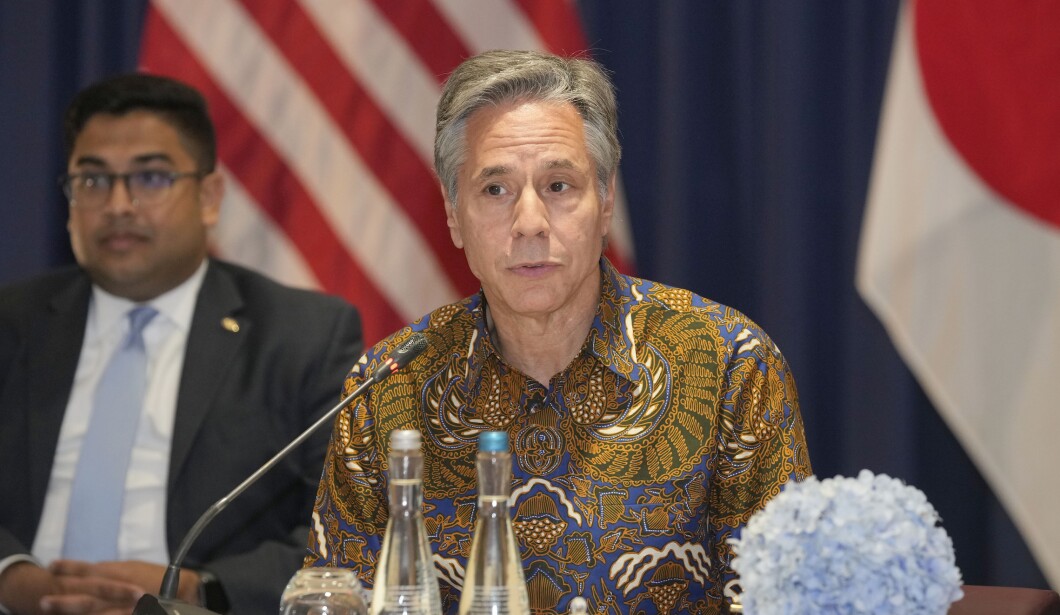
Chinese officials have wavered in their refusal to hold defense talks with the United States as President Joe Biden’s administration casts Beijing as a reckless power in a region anxious to avoid unrest.
“The two sides need to start with specific steps to … creat[e] conditions and remov[e] disruptions for stabilizing China-U.S. relations,” Wang Yi, the director of China’s foreign affairs commission, told Secretary of State Antony Blinken. “The U.S. needs to … expand the communication channel in diplomatic and security fields, make their communication more effective, and promote smooth people-to-people exchanges.”
TYRANNY OF THE MAJORITY, OR THE MINORITY OF ONE
That exhortation, delivered on the sidelines of an Association of Southeast Asian Nations summit in Indonesia, makes for a marked contrast with Beijing’s recent posture. Just last month, Chinese Defense Minister Li Shangfu told the Shangri La Dialogue that the United States is “disrupting peace in the region.” Secretary of Defense Lloyd Austin rebuked Beijing for closing communications while staging provocative encounters between Chinese and U.S. military personnel, and Blinken retired to the same hotel with a message of stability.
“Both the U.S. Indo-Pacific Strategy and the ASEAN Outlook on the Indo-Pacific underscore ASEAN’s centrality, and we share a vision of an Indo-Pacific that is free, open, prosperous, secure, connected, and resilient,” Blinken told his ASEAN counterparts during their summit at the Shangri-La hotel. “That means a region where countries are free to choose their own path and their own partners; where problems are dealt with openly — not through coercion; where rules are reached transparently and applied fairly; where goods, ideas, people flow lawfully and freely across the land, the seas, the skies, and cyberspace.”

Wang adopted the communicative pose just days after a rare meeting in Washington between a top Pentagon official and Chinese Ambassador Xie Feng. The Chinese envoy told Assistant Secretary of Defense Ely Rainer that the United States should “work with China in the same direction to gradually bring the state-to-state and mil-to-mil relations back to the right track,” reportedly a reference to Beijing’s desire for Biden to lift the sanctions imposed on Li in 2018, when he led an office involved in arms deals with Russia. But Pentagon officials maintained that these sanctions do not ban dialogue between the senior leaders.
“Military-to-military communication, that is something that we will continue to seek out,” Pentagon press secretary Pat Ryder told reporters Thursday. “As we’ve said before, there is no barrier to communication between Secretary Austin and his counterpart, as it relates to these sanctions. Secretary Austin can talk to his counterpart, and of course that is something that we would welcome.”
Wang’s public position at the ASEAN dialogue, so soon after the Ratner meeting, could be an attempt to score diplomatic points in a region that both countries regard as a fulcrum of geopolitical influence.
“Maybe that’s a sign that the Chinese are more willing to engage than we thought,” American Enterprise Institute senior fellow Zack Cooper told the Washington Examiner. “On the other hand, maybe this is just messaging, and they feel like they’re under a little bit of pressure, and the best way to get out of the pressure is just to say that they’re going to do these meetings even [if] they actually have no intention of changing their behavior in any fundamental way.”
Cooper added that “folks in our system generally don’t know which” line of interpretation is correct.
“As major countries with important influence, China and the U.S. should respect the efforts of regional countries, support ASEAN centrality, and avoid bringing disputes and complex factors into regional cooperation,” Wang added.
The diplomatic pressure was apparent as Blinken met with officials from other countries in the region. Indonesian Foreign Minister Retno Marsudi, who hosted the conference, applauded “U.S. presence in the region” as a bulwark for “an inclusive regional architecture through concrete cooperation” during a bilateral “strategic dialogue” with Blinken.
CLICK HERE TO READ MORE FROM THE WASHINGTON EXAMINER
And Blinken touted U.S. support for “freedom of navigation in the South and East China Seas and maintain peace and stability across the Taiwan Strait” in his appearance before the ASEAN foreign ministers, in a clear reference to China’s illegal claims to sovereignty over most of those waterways.
“Certainly a big part of the conversation today is a determination of all of the countries in the region, independent of the United States, to make sure that … freedom of navigation, freedom of commerce, freedom of overflight are all upheld on the basis of international law,” Blinken told reporters after the summit. “So we’ll continue to collaborate there as well. That really is a big part of the basis of ensuring that we have a region that is genuinely free, open, prosperous, secure, connected, and resilient.”





